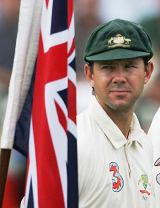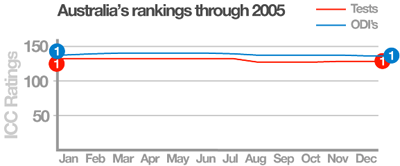Intimations of mortality
|
|

|
Matthew Hayden and Justin Langer could not dominate, Ponting struggled with the demands usually associated with rival captains, the middle-order was befuddled by reverse-swing, Adam Gilchrist was more Clark Kent than Superman, and the back-up bowlers were loose and ineffective. Only Shane Warne and Glenn McGrath performed as expected, but a stray ball that caused McGrath's ankle injury in the lead-up to the second Test could have cost them the urn.
Australia's one-game lead was removed with the gripping two-run loss at Edgbaston - the tail-end batting was sensational to get them so close - and from there the underdogs ruled despite the narrowness of the following results. A day of rain, a brilliant century from Ponting and more gutsy batting from Brett Lee secured a draw at Old Trafford, but England ruffled Australia again without McGrath at Trent Bridge, where both Ponting and Simon Katich exploded.
The series ended at The Oval and while Trafalgar Square celebrated another famous victory the Australians flew home wondering where it all went wrong. The unloseable trophy had disappeared in a flurry of red, white and blue bunting. There was much to analyse and the former lynchpins of Jason Gillespie and Damien Martyn were part of an unfamiliar cull that also included Katich, Mike Kasprowicz and Michael Clarke by the Australian summer's West Indies series. Trevor Hohns and his selectors had re-found their ruthlessness; it was too late for the Ashes, but it was time for generational change.
Nothing Ponting achieved in the nine other months could erase the year's defining moments in England. Beating the World XI in the Super Test and three one-day matches mattered more to their wallets than the credibility of the concept, although it showed they were capable of a swift recovery. A clear verdict over West Indies before South Africa arrived for the current series proved their damaging performances against mediocre opponents remained, and that new additions such as Michael Hussey and Brad Hodge deserved their appointments. As the winning habit returned - it was slowed by South Africa in the first Test at Perth but the crushing win at Melbourne made adequate amends - it was difficult to believe the Ashes had happened. In some cases it had almost been written out of history.
The year started with the final stage of a three-match cleansweep of Pakistan and was followed by the VB Series success against Inzamam-ul-Haq's outfit. New Zealand suffered a 5-0 one-day demolition, a result they improved on during the Chappell-Hadlee run sprees this month, and only rain prevented a 3-0 Test result as everything looked and felt rosy for the country's most coveted tour.
Things began slowly in the United Kingdom and the stumbling NatWest Series campaign ended in a tied final with England before they hit back to win the similarly named NatWest Challenge, which was equally useless as Test preparation. It would be the only trophy Ponting lifted in England. Australia won eight of 14 Tests until Boxing Day and 21 of 29 ODIs, but a year involving a limited-overs loss to Bangladesh and the Ashes defeat will always be one to forget.
New man on the block - Michael Hussey Saying Hussey has arrived with a bang is an understatement. Having waited patiently while piling up first-class runs, Hussey made the next step another prolific one and entered the South Africa Test series averaging 120.33 and 151.00 in limited-overs matches. If his streak continues expect him to be prominent at the Allan Border Medal.
Fading stars - Jason Gillespie and Damien Martyn Gillespie became Australia's fifth-most successful bowler when he passed Richie Benaud's 248 Test wickets in England, but he was dropped for Trent Bridge and his career is currently as a state player, which is just like Martyn's. The country's best batsman in the year before the England tour, Martyn was dumped after averaging 19.77 during the Ashes. A broken finger at the start of the summer ruined his chances of a quick return and ruled him out of the New Zealand one-day tour.
High point - The Ashes recovery The gap between the Ashes and the Super Series was barely three weeks but the Australia side that turned up in Melbourne was dramatically different in attitude, intensity and results than in England. It was almost as if the most damaging loss in the players' careers was a myth and they deserve praise for the sudden revamp.
Low point - The Oval The choreographed bail flicks of Billy Bowden and Rudi Koertzen that ended a bad light delay and started England's Ashes celebrations. Australia's comeback was left too late, 16 years of dominance had finished and months of English gloating began. It was difficult to know which was worse.
What does 2006 hold? More rebuilding. The World Cup will become the one-day emphasis while securing a line-up that can deal with England's bowling attack and intimidate Vaughan, Pietersen and Flintoff are the Test priorities. Sealing the Ashes in 11 days, which they did in 2002-03, is as unlikely as MCC allowing the urn to stay in Australia.
| Matches | Won | Lost | Drawn/ Tied/ NR | |
|---|---|---|---|---|
| Tests | 14 | 8 | 2 | 4 |
| ODIs | 29 | 21 | 5 | 3 |

Peter English is the Australasian editor of Cricinfo

